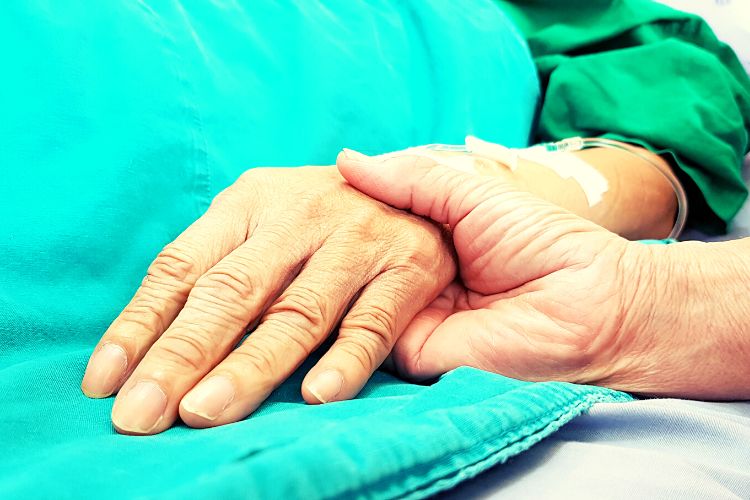It’s not a topic that many of us like to discuss but it’s one that we should be more aware of. After all, there will come a point that all of us have to face the death of a loved one, and eventually, it’s something we will go through ourselves.
Understanding what happens at the end of life can make the situation much less intimidating. It’s still going to be an immensely difficult time but knowledge makes things easier to understand and gives you an idea of what to expect. Some of the things that happen at the end of life can seem incredibly terrifying, when in most cases, they’re very normal.
There are many more stages to death than a lot of us understand. Where sudden or unexpected death is concerned, the process is naturally going to be different. However, for the most part, the signs of death and changes to a person’s behaviour, diet and other things can begin happening weeks in advance.
We encourage you to read through this guide which will provide a timeline of some of the things you can expect when helping a loved one through the final stages of their life.
Understanding The Stages Of Death
Every death is a unique experience. However, in the case of hospice patients both in a care facility and at home, there is usually a pretty standard pattern of events in the lead up to death. Your loved one may show some or all of the signs we are about to discuss.
In The Weeks Leading Up To Death
What many people aren’t aware of is that the signs of death can begin to show several weeks before the person passes away. These usually include changes to the person’s behaviour which could include dietary changes, changes in their sleep and how they interact with other people.
For example, a lot of people will begin sleeping more than usual. This could include sleeping for longer periods of time or taking more regular naps. Despite sleeping a lot, the person may appear to be fatigued.
Where diet is concerned, the person may not want to eat hard to digest foods. Over the course of time, it is not unusual for a dying patient to stop eating solid foods altogether although this will be a gradual process.
This can be worrying for you if you are caring for a dying loved one however, it is really important not to force them to eat. Doing this will only cause them stress and discomfort. It can become difficult to swallow during this stage of death, nausea is also common and the person may also be experiencing generalised pain.
Even for people who have been incredibly social over their life, the early stages of death can sadly cause some people to withdraw. They may not communicate as much and they won’t be as active as they usually are.
While most people tend to reject company or spend more time alone, there are patients that will appear to be completely unresponsive. While this can be difficult, it is a normal part of withdrawal. However, do keep in mind that the person will still be able to hear you so keep communicating with them and providing them with reassurance.
On the other hand, if the patient is a child, it is not uncommon for them to talk more than usual even though they may stop doing other activities.
There’s no right or wrong at this time. Allow your loved one to go at their own pace here and be aware that they may begin talking metaphorically. This usually happens as a way for the person to cope with their imminent death.
There may also be a range of physical symptoms such as an increased vulnerability to infections as well as delicate skin which is damaged more easily. Some people may also experience abdominal swelling. All of these things are normal but if you are at all concerned, do seek medical advice.

In The Days Before Death
As we get closer to death, the days beforehand can see a lot of changes to the body. Most commonly, people will experience respiratory problems such as congestion and fluctuations in their breathing pattern. This congestion causes what is known as the death rattle.
In addition to this, the person may puff out their lips as they exhale and their rate of breathing could be as many as 50 cycles per minute or as few as 6. Coughing is not uncommon but the comforting news is that these symptoms are not usually accompanied by any pain.
Other physical symptoms that happen at this time are less frequent urination and bowel movements and lower blood pressure. The person may also experience changes to their body temperature as well as a further decrease in appetite and changes to their sleep. Some people may also have blotchy or irritated skin.
Hallucinations are not uncommon in the final days before death. In a lot of cases, the patient may be appearing to communicate with deceased people or loved ones who aren’t in the room. When this starts to happen, it is a clear indicator that death is imminent so you will need to start monitoring your loved one a little more closely. How long death takes after this is different for each person.
The Final 24 Hours Of Life
The last 24 hours of life are usually spent sleeping so don’t be concerned if your loved one is not aware for most of the time. When they are aware, they may not be able to communicate as they normally would since the senses are beginning to shut down.
That said, most people will still be able to hear so it’s really important to continue talking to your loved one as they will require reassurance at this time.
You’ll notice that any physical symptoms your loved one has experienced thus far will become intensified. Skin blotching on the hands and feet is one of the most obvious signs as well as things like even less frequent urination and difficulty breathing.
A lot of people may suddenly ‘perk up’ and this can be confusing as this burst of energy is short lived and the person will begin to fade again up until the point of death.
The Final Few Hours Of Life
As life draws to a close, the body begins to shut down entirely. The internal systems such as the circulatory and respiratory systems will start to slow, eventually failing.
The failure of these systems can mean a display of further symptoms such as outbursts and a drop in body temperature. Where your loved one may have been able to somewhat communicate with you prior to this stage, their ability to do so now will be incredibly limited. In most cases, they will be unresponsive but they should still be able to hear you.
The eyes may appear teary and the hands may feel cold. At this stage, your loved one may experience further, and more intense hallucinations and they will spend an enormous amount of time sleeping. It will be very difficult, if not impossible to wake them.
The breathing will be severely affected with a person gasping and their breathing may stop altogether.
Caring For A Loved One During The Lead Up To Death
Spending those final few days and weeks with your loved one and providing them with the care they need can be a very rewarding and special experience. However, this is also one of the most difficult things you will ever have to do, emotionally speaking.
Still, most of us want to make sure that our loved ones receive all the care they need so it’s important to make sure you understand what’s expected of you. If you are working with a medical or hospice team then they will share the care with you and will be able to provide you tailored advice for your loved one.
The main point of hospice care is to ensure that the person has a good quality of life in their final weeks and days. It’s about making them comfortable and still being able to spend quality time together.
It’s important to listen to your loved one, especially where diet is concerned. Make sure that you keep them hydrated but don’t force food on them. Ice cream can be useful as it’ll keep their hydration levels up and isn’t difficult to eat.
If the patient is bed bound, then it’s vital to move them and keep them clean otherwise there is a risk of bedsores which could become very painful and infected.
As well as physical care, it’s important to take care of yours and your loved ones emotional and mental health. Death is incredibly difficult for all parties involved so keeping communication open is a must. It’s important for you to provide emotional support for your loved one but also to give yourself some alone time to process what is happening.
Make sure that you ask your loved one about their preferences and what to do when they become unresponsive.
Knowing When Your Loved One Has Died
At the end of this process, your loved one will pass away and this can be a difficult enough time as it is. However, what a lot of people struggle with is knowing whether or not the person has indeed died.
During the dying process, there will be many times that your loved one is not responsive and this can be confusing. In some cases, the person may have passed away but this could be mistaken for sleeping. In other cases, the person may only be sleeping but showing little responsiveness and this could be mistaken for death.
Some of the signs that your loved one has passed away may include their eyes and mouth being open and they may take gasping breaths which become further and further apart. The most obvious sign of death is that the person cannot be woken up.
If you do believe that your loved one has passed away then you’ll need to contact a professional. In many cases this will be a hospice nurse. However, if your loved one is not under the care of a hospice then you can contact the family doctor who will make the necessary arrangements to remove the body from the home.
Final Thoughts
The death of a loved one is never an easy time but knowing what to expect can make things a little less frightening for everyone involved. Death is a natural process and the body will undergo several changes in the weeks leading up to death.
If you are caring for a loved one at home during these final stages of life then you’ll need to make sure that you’re aware of what will happen and how to provide the best care.
